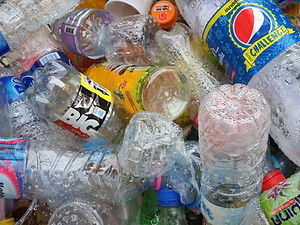

The Middle East’s first 3D Printer Filament manufacturer using recycled materials
The Global Plastic Problem in Numbers:

Plastic Waste Problem
According to National Geographic, 91% of plastic isn’t recycled. The amount of plastic we have produced is the equivalent of 25,000 Empire State Buildings or 75 million Boeing 787 Dreamliners. Meaning that there are over 67 million Boeing 787s or 23,000 Empire state buildings worth of plastic that is not recycled. Moreover, in Kuwait specifically, the amount of plastic waste is estimated at 18% of all solid waste produced in the country each year, equivalent to 181,440 tons, according to the Kuwait Institute for Scientific Research’s (KISR) director-general, Dr. Samira Omar.

The Numbers
PET bottles are one of the main contributors to plastic waste. To give you some perspective on how bad the situation with plastic bottles really is, only about 29.6% of all plastic bottles are recycled each year, and over 500,000,000,000 bottles are used annually, that means over 350,000,000,000 plastic bottles are either sent to landfills or even worse, polluted into the environment. To show you how large that number is, it takes roughly 200 million plastic bottles to circle the earth, and with the number of plastic bottles that aren’t recycled each year we can circle the entire earth 1,750 times!!

Highest plastic waste generation in the world!!
After some research, I found that Kuwait is shockingly the highest in terms of plastic waste generation per capita in the world! I feel that because of this, we as young Kuwaitis should do more to tackle this problem and should take the lead in finding solutions to address it, with measurable results.

ABOUT
We are a youth founded and run micro-manufacturer. The vast majority of plastic waste globally and in Kuwait is in un-recycled. Our goal is to create products of economic value from our plastic waste and help ensure they are permanently diverted from our landfills and environment. Our target is to reach a production capacity of 7-10KG of 3D printer filament per day, which would result in removing 3.5 tons of plastic waste out of the environment. Additionally, because we are producing locally, we are eliminating the environmental impact of importing heavy and bulky 3D printer filament from overseas and its long distance shipping impact by taking out 21 CO2 Emissions (T) associated with transporting 3.5 tons of filament and its packing to Kuwait.
1st recycled filament producer in Middle East
1st downstream manufacturer of any kind using recycled PET bottles in Kuwait
1st producer of 3D filament of any kind in Kuwait
Project Details

Details
We consider ourselves an experimental manufacturer at this stage and are still perfecting our manufacturing consistency and the quality and printability of our filament. We are experimenting with various plastics. Our current focus is recycled PLA and PET bottles.
We are successfully extruding filament from recycled PLA with consistently good results and printability. PET has been more challenging with mixed results and we continue to tweak our formulation and extrusion parameters. For both materials, but especially with PET, we have worked to improve our pre-cleaning, decontamination, and dehumidification process to improve our results. We have partnered with Kuwait's largest PET Bottle recycler Omniya and working with them to provide us with the PET regrind with contamination levels acceptable for our process.
We are starting very small, as a micro-manufacturer, but we are set up to scale easily and rapidly, and hope to be a leading closed loop manufacturer contributing towards the goal of having a zero waste economy in Kuwait.

Why 3D Printer Filament?
According to research reports the 3D printing market is valued at USD 13.7 billion in 2020 and is expected to reach a value of USD 63 billion by 2026, with an annual growth rate of around 30%, therefore, the 3D printing market ensures consistent demand, making it a financially viable project. 3D printing also positively contributes to several UN Social Development Goals, since it decreases the amount of unwanted/wasted output compared to traditional manufacturing, and because it is on-demand manufacturing it needs less storage, and decreases overproduction.
We conducted extensive technical research on the technologies and methodologies needed to ensure successful production, followed by economic viability analysis and detailed costing of the operation, until we found the most efficient set up.
We researched various extrusion technologies and solutions, material characteristics of PET and other plastics, and how to address the challenges with high level of contaminant in the regrinded PET that could be a challenge for 3D printer extrusion.
Our 1st production of filament in Kuwait!
LOOP Process
Recognition

On November 22nd 2021 LOOP was honored at the Austrian Embassy as the Kuwait winner of the Energy Globe Award (“The World Award for Sustainability”). The award is organized in partnership with the United Nations Industrial Development Organization (UNIDO) and the Austrian Government. The award was presented by the Austrian Ambassador to Kuwait and the Austrian Trade Commissioner for Qatar and Kuwait in a ceremony held at the ambassador's residence attended by the national media.
“With more than 180 participating countries, the ENERGY GLOBE Award is today’s most prestigious environmental award. It is awarded annually to projects saving our environment by personal action, sustainable projects or campaigns for raising awareness in sustainability.”
A maximum of one national winner is selected in each country and Kuwait’s last winner was the Kuwait Oil Company in 2019 for their multi-billion dollar project Kuwait Environmental Remediation Program (KERP).

Please find below selected links to the national media coverage:
-
A statement from Marzouq Al-Ghanim, Speaker of Kuwait’s Parliament, on the award (Arabic):
-
Arab Times (English):
-
Kuwait Times (English):
-
Alanba (Arabic):
-
Alqabas (Arabic):
-
Alrai (Arabic):
-
Sustainable Living Kuwait (Arabic + English):
-
SNN (Arabic):
Awards Continued:
RISE Challenge
Global finalist for the 2021 Schmidt Futures/Rhodes Trust RISE Challenge. Awarded $1,000
2020 Global Changemaker Challenge
Smithsonian/Global CoLab 2020 Global Changemaker Challenge Awardee and $500 grant winner

